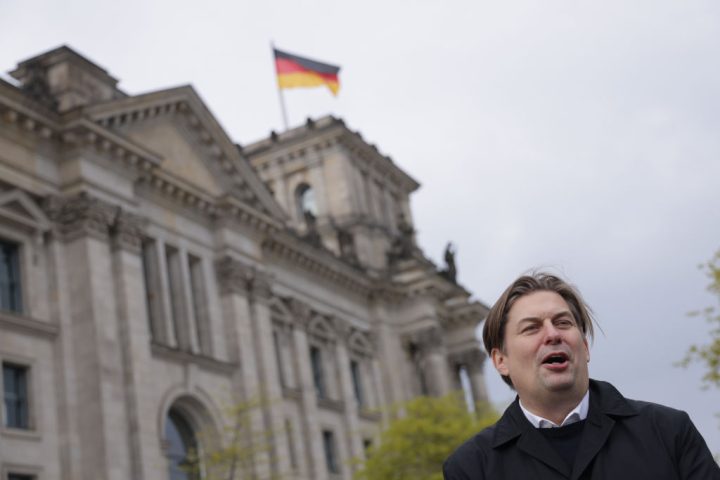As the German AfD’s European election campaign kicks off tomorrow, the far-right party’s leadership could be forgiven for counting down to polling day in June with dread. This campaign launch marks the end of a torrid fortnight for the party that is threatening to jeopardise the AfD’s future in Brussels.
Two of the party’s top politicians have been embroiled in foreign influence scandals that have plunged the party into crisis. On 19 April, Der Spiegel reported that Petr Bystron, the AfD’s second-choice party list candidate at the European elections, was caught in a sting operation receiving ‘small packages’ of money from a Russian businessman who managed a now-sanctioned Kremlin-backed propaganda site, Voice of Europe, in Prague.
The AfD is now 11 years old and is no longer the upstart, reactionary movement it was at its inception
The video was said to prove allegations made in March that Bystron had received money from the website, reportedly in order to fund the hiring of new staff at the European parliament. Across three dates between October last year and February when Der Spiegel alleges the two met in Bystron’s car, the businessman, Artem Marchevsky, is said to have handed over the equivalent of £17,000 to the AfD MEP.
Both Marchevksy and Bystron deny the allegations, but the public prosecutor’s office in Munich, where Bystron lives, has opened an investigation into him, while Marchevsky has since been sanctioned by the Czech government. The AfD has also said it is looking into the matter.
The uproar around Bystron may well have blown over, or at least disappeared down the news cycle, were it not for a second scandal. On 23 April, news broke that a parliamentary aide for Maximillian Krah, Bystron’s colleague at the European parliament and the number one party list candidate for June’s election, was arrested on suspicion of spying for China.
The aide, named only as Jian G. due to Germany’s privacy laws, was arrested in Dresden and stands accused of revealing internal information from the European parliament to the Chinese secret service. He is also alleged to have spied on Chinese opposition members in Germany. The German authorities believe his espionage predates his hiring by Krah in 2019.
Krah denies having any knowledge of his aide’s alleged activities. That might have been the end of the matter were it not for the fact that, exactly a week beforehand, it was reported that Krah himself was questioned by the FBI on a trip to New York in December. The allegation? That Krah, too, was suspected to have received money from pro-Russian activists with ties to the Kremlin.
Krah confirmed that the FBI had questioned him, but denied any wrongdoing. But even just the whiff of scandal around him was more than the AfD’s top brass are willing to tolerate.
And yet, with just six weeks to go until the European parliamentary vote opens on 6 June, the party’s leadership are in a difficult position. It is too late to remove either Krah or Bystron from the ballot papers or bump other candidates further up the list as the papers have already been printed. But allowing both to continue representing the party risks handing ammunition to the party’s many critics who believe the party is a risk to Germany’s democratic sovereignty. Krah himself remains defiant about the future of his career: ‘If you think this is the end of my candidacy, then I have to disappoint you. I am and will remain the Spitzenkandidat.’
On Tuesday evening, Krah was summoned to Berlin for talks with the AfD’s co-leaders Tino Chrupalla and Alice Weidel. The ‘Spitzenkandidat’ has been ordered to stay away from today’s campaign launch and keep a low profile until the election takes place – a strategy worlds away from the AfD’s usual combative style of campaigning. This instruction is also particularly ironic given that when the allegations against Bystron first surfaced, Krah had advised his colleague to stay away from the campaign trail until the matter had been resolved.
That Chrupalla and Weidel have told Krah to stay away is, in itself, surprising. It suggests that the AfD’s top brass is reluctant to lose the hard work it has put in to normalise the party with voters, doing its best to veer away from sensationalist policies and rhetoric, conspiracy-mongering and illegality. The AfD is now 11 years old and is no longer the upstart, reactionary movement it was at its inception; the party’s leadership are clearly keen for this to be recognised by the German public.
Unsurprisingly, German MEP candidates from other parties are capitalising on the AfD’s crisis. The number two candidate for the CDU/CSU and current MEP Daniel Caspary accused the party of revealing its ‘true, unpatriotic face’ through the saga. ‘Anyone who votes for the AfD in the European elections is voting for more influence from Russia and China.’
Caspary’s condemnation neatly summarises the sentiment with which many across Germany’s political spectrum view the AfD. The party is known for its illiberal stances on issues such as immigration and civil rights. Many Germans feel jumpy about the laxity with which the party has flirted with neo-Nazi rhetoric (one of the party’s regional politicians, Björn Höcke, is currently standing trial for using a slogan reminiscent of one favoured by Hitler’s stormtroopers during a rally in 2021). The idea that some of the party’s most prominent politicians could be entertaining influence campaigns by Russia and China add to the notion that the party is doing its best to undermine the country Germany has managed to reshape itself as over the last 80 or so years.
Last year, as the AfD continued to climb in the polls, the party’s critics wondered if the spell it seemed to have large portions of the German population under would ever break. Now, it increasingly looks like it has. The party started the year on an all-time high, polling at 22 per cent; but according to a new survey released yesterday, were the European elections to take place today, they would achieve just 15 per cent.
The European parliamentary elections will prove a significant test for the AfD ahead of three key state elections in Thuringia, Sachsen and Brandenburg in September. Any successes the party has in June will remain tainted by these foreign influence scandals – after that it will be a race against the clock to stop the rot spreading further.








Comments